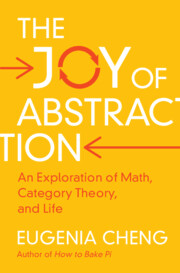Book contents
- Frontmatter
- Dedication
- Contents
- Prologue
- Part One Building up to Categories
- Interlude A Tour of Math
- 9 Examples we’ve already seen, secretly
- 10 Ordered sets
- 11 Small mathematical structures
- 12 Sets and functions
- 13 Large worlds of mathematical structures
- Part Two Doing Category Theory
- Epilogue Thinking categorically
- Appendices
- Glossary
- Further Reading
- Acknowledgements
- Index
11 - Small mathematical structures
from Interlude - A Tour of Math
Published online by Cambridge University Press: 13 October 2022
- Frontmatter
- Dedication
- Contents
- Prologue
- Part One Building up to Categories
- Interlude A Tour of Math
- 9 Examples we’ve already seen, secretly
- 10 Ordered sets
- 11 Small mathematical structures
- 12 Sets and functions
- 13 Large worlds of mathematical structures
- Part Two Doing Category Theory
- Epilogue Thinking categorically
- Appendices
- Glossary
- Further Reading
- Acknowledgements
- Index
Summary
In this chapter we zoom in and look at small examples of mathematical structures that we can express as categories. We start with small drawable examples, that is, finite categories, and also sets expressed as discrete categories. We then move on to monoids expressed as categories with only one object, and unravel that to give the elementary definition of a monoid as a set with structure. We describe the monoid of natural numbers as generated by a single arrow consisting of a non-trivial loop. We explain the “dimension shift” involved in forgetting the single object and focusing on the set of morphisms as the underlying data. We then move on to groups expressed as categories with only one object in which every morphism has an inverse, and then unravel that as an elementary definition. Examples include modular arithmetic and groups of symmetries. We include some broader context about group theory. Finally, we introduce the idea of points and paths in a space, touching on some of the concepts of topology and homotopy, without technicality (we include some technical details in an Appendix).
Information
- Type
- Chapter
- Information
- The Joy of AbstractionAn Exploration of Math, Category Theory, and Life, pp. 124 - 135Publisher: Cambridge University PressPrint publication year: 2022
